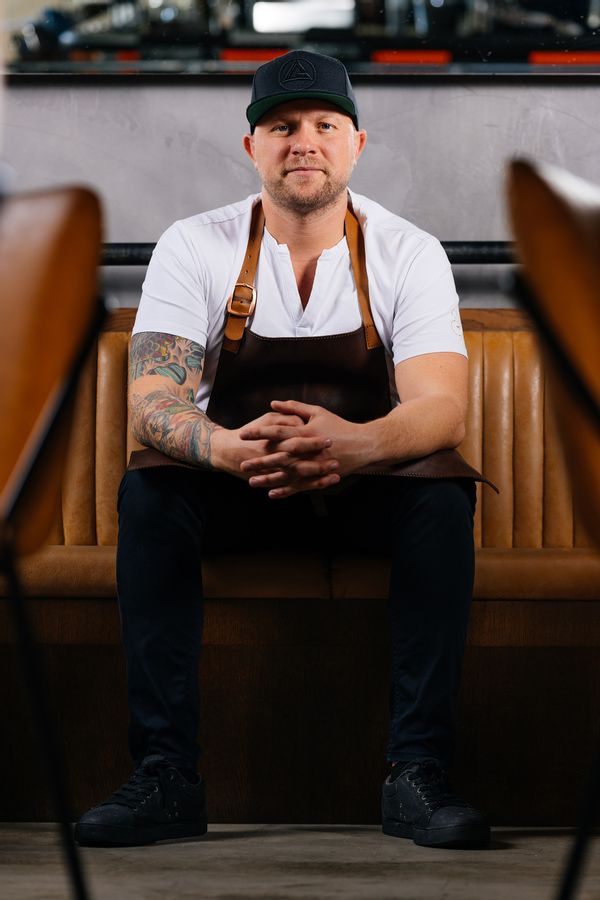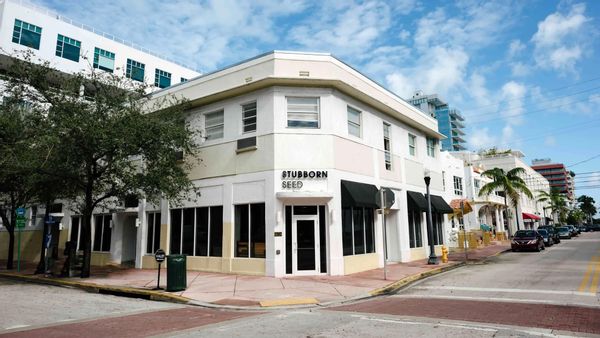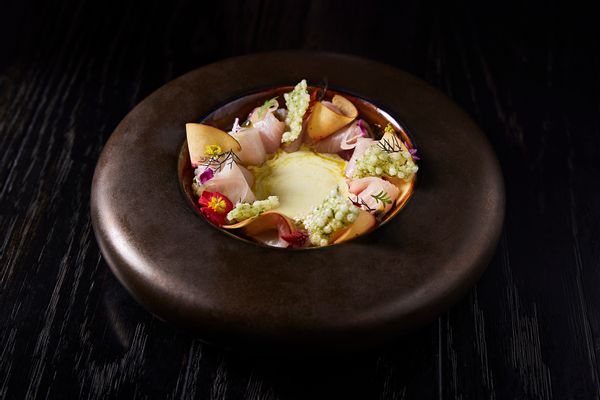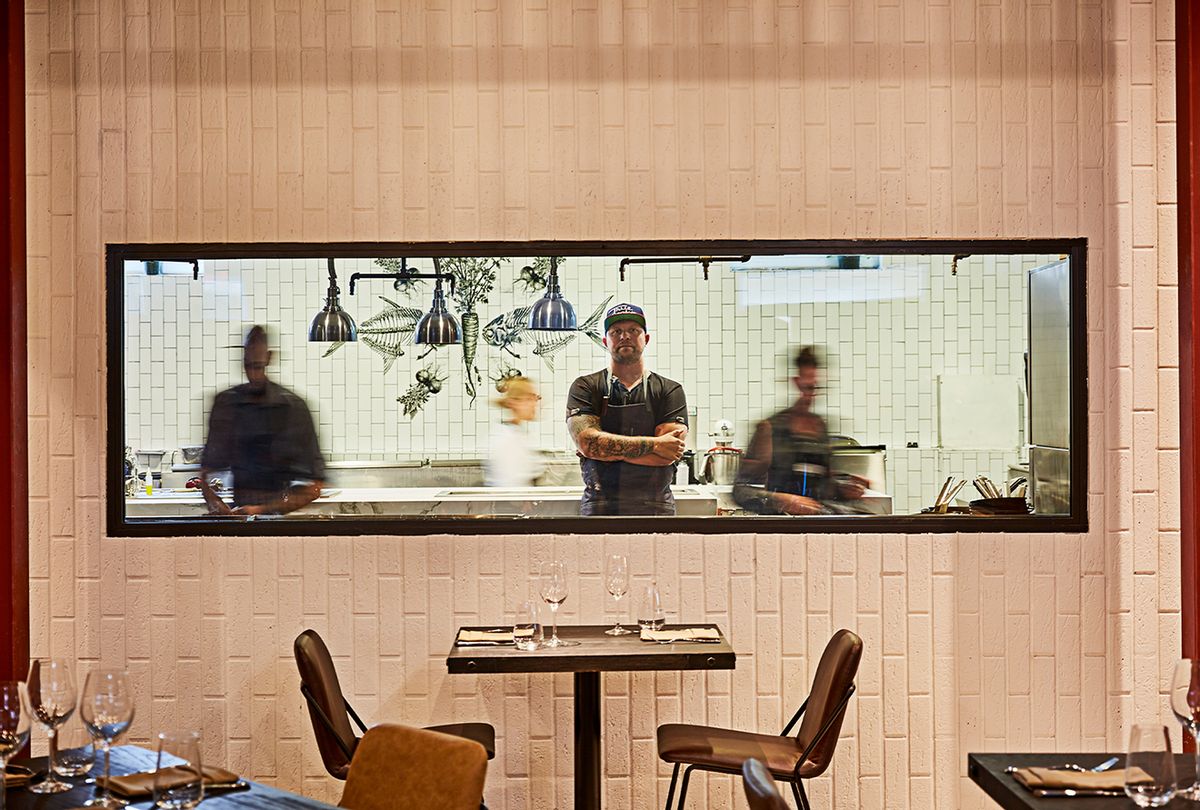Back in 2015, "Top Chef: California" aired, featuring challenges filmed all throughout the state. Chef Jeremy Ford was crowned the victor, besting Chef Amar Santana (who would then return to compete in Top Chef: World All Stars just last year), after a highly competitive season also featuring "fan favorite" Chef Isaac Toups, along with some other favorites, namely Chefs Karen Akunowicz, Marjorie Meek-Bradley and Carl Dooley.
Ford won the first elimination challenge (as many eventual "Top Chef" winners tend to do), followed by further QuickFires and elimination challenge wins prior to his crowning in the finale. His "Top Chef" journey was pretty linear, starting with vigor, sliding into the middle-of-the-pack as the competition wore on and then emerging towards the end of the competition as an intrepid, talented chef with clear-cut vision and insight into all things food, flavor and dish composition.
Now, almost ten years after filming, Ford oversees two restaurants — including The Butcher's Club and the Michelin-starred Stubborn Seed in Miami — and has also recently opened his own farm, Ford Farms, which is now producing much of the fresh produce that he uses in his dishes at his restaurants.
Salon Food had the opportunity to speak with Ford about his balancing fatherhood and restaurant life, his time on "Top Chef," what led him to farming, how food and cooking initially captured him and more.
 Chef Jeremy Ford, winner of Season 13 of "Top Chef" and owner of the restaurant Stubborn Seed. (Grove Bay Hospitality Group)
Chef Jeremy Ford, winner of Season 13 of "Top Chef" and owner of the restaurant Stubborn Seed. (Grove Bay Hospitality Group)
The following interview has been lightly edited for clarity and length.
Can you tell me about Ford Farms? What led to your wanting to get into farming?
It actually kind of started as a different idea. I pulled the permits and plans to build a test kitchen at my house because it's difficult to create recipes when I'm at the restaurant — there are a million and one things to be done and questions to be asked, so I designed a test kitchen in my backyard. It started off in a very creative place, but then it grew to why it would be so small? It kind of drew me to, how can we do this with more space? And then the rabbit hole began. We started searching for properties and it started at two acres, then four and now we are at five.
It gave us the opportunity to creatively design food, growing vegetables and fruits. Then it eventually led to us thinking — let’s do a full-on farm. Fast forward to 10 months, now we’re planning on having chickens in the coming months and then pigs as well.
Do you use produce from the farms at Stubborn Seed and The Butcher's Club?
We’re using the produce at Stubborn right now. Farmers in Miami typically stop farming around in the summer or even earlier and take a three month break because it's so hot. We’re still growing because we’re like why not? Let's see what happens.
Pests are amplified by a thousand during the summer time and we’re getting to the point now where our focus is going to shift out of growing, fertilizing and adding nutrients to finishing up our event space.
We're getting ready to plant about 100 fruit trees [like] mango, lychees, jackfruit, sapadilla, sapote. We’re going to really go nuts with the tropical fruit trees. So we’re changing gears and getting that going.
The last 10 months have been really great. We learned what worked and what didn't work. We were able to supply the restaurants with quite a bit of produce and we were able to stop ordering commercial produce. We supplied our own tomatoes, herbs, flowers and garnishes. We did a great job considering we had zero experience.
This year we’ll be able to supply more to the restaurants, popping up at farmers markets to get the name and brand out there more as well.
Want more great food writing and recipes? Subscribe to Salon Food's newsletter, The Bite.
How would you differentiate between your restaurants?
They’re very different. The Butcher’s Club is more of a steakhouse/raw bar. At The Butcher’s Club, it’s more family-friendly, you can come with your kids. There’s something there for everyone.
Stubborn Seed is tasting menu-forward. It's a whole experience. At Stubborn, you sit down and you let us take you on a journey. But both restaurants do speak to the same seasonality focus. And our chefs at both restaurants are always trying to learn and push forward.
Congratulations on Stubborn Seed Las Vegas. How are you preparing for that opening? Will you be traveling a lot between Miami and Vegas? How do you plan on balancing that with the farm, the restaurant and your personal life and fatherhood?
That's going to be really tricky to be honest. I'm going to learn as I go. I've reached out to some of my mentors that work with a lot of restaurants. I've talked to Dean Max about that a lot. Stubborn Seed is a very distinct restaurant that is hands on and requires a lot of focus. It’ll be hard for me to let go.
Every restaurant I've been a part of I think about that balance. I go through phases of worry, but once my great team is out there in Vegas it'll be easier. You just have to remember to take a deep breath and go day by day. There are always good days and bad days. You just have to find a way to come to some sort of balance.
Facetime helps a ton when I’m out of town. I FaceTime the family a lot. This is the career I chose and I knew it was going to take me for a ride, but I’m super excited for the journey and what’s next.
 Exterior of the restaurant Stubborn Seed. (Grove Bay Hospitality Group)
Exterior of the restaurant Stubborn Seed. (Grove Bay Hospitality Group)
For those unaware of your journey since winning "Top Chef," can you break it down for them?
After my win, I came back to Miami and partnered with local restaurant group, Grove Bay Hospitality Group, to open Stubborn Seed back in 2017. We built such an incredible team there and in 2022 when the Michelin Guide announced its first stars in Florida, Stubborn was awarded one star.
In late 2021, I opened The Butcher’s Club at the PGA National Resort in Palm Beach Gardens. And now, the plan is to open Stubborn Seed Las Vegas later this year!
Top Chef was some time ago at this point for you, but of course, I have some questions about your experience. To start, how was it overall? Highlights? Lowlights?
The great connections I made with the other contestants was one of the biggest takeaways for me. I had the opportunity to compete with some of the best chefs in the country. We’re seeing the entire team from that season are some of the best chefs out there, you see James Beard Award winners, Michelin Starred restaurants. It was such a great experience to work with and network with everyone. It’s great to see how everyone is doing in different parts of the country and having those relationships.
Seeing Padma [Lakshmi] or Tom [Colicchio] love one of my dishes was also definitely another highlight. I won a lot of challenges, but there were times where I almost got eliminated too. Low moments were missing my family. I was gone quite a long time so it was tough not seeing them.
Competing was definitely a rollercoaster of emotions. It was great to see myself grow. Working in tough conditions and putting food out in 20 minutes is a nightmare, but I found out what I was made of and it launched me to where I am today.
It was great seeing you for a moment in the Fish Boil episode on the most recent season of "Top Chef". How was that for you?
I loved seeing Kristen [Kish] in her new role. She did it so well and brought such a fresh, new vibrant vibe for a show that's been around for 20-plus years. She was made for it and it was great seeing her thrive in that role. It was fun to help the contestants and do some shopping for them too.
On season 13, do you think there was a particular standout dish that really sealed the deal for you?
Yes, the dinner that we did in San Francisco was my personal favorite. There was a restaurant that had been there for many, many years that closed, Fleur De Lys. We got the chance to reopen it and cook there — I thought it was the coolest thing to experience. Keller was there. It was an awesome night. Hearing from him in his own dining room, being there in that environment and working to have him say the menu we put up was something he would put on his own menu was so rewarding.
Of course, Chef Buddha Lo is the only US winner to have won the crown twice. If another "All Stars" were to be planned, would you be open to competing?
No, I don't think so. I'm pretty much retired from the competition world. I did "Fast Foodies" and "Iron Chef," helping some friends of mine. My focus now is more on my restaurants, building my team and the farm.
What was the biggest lesson or takeaways you gleaned from competing in — and winning — "Top Chef"?
Before going on the show I was very scared and not as confident as I probably should have been and I think after going on and going through the ups and downs of the entire process it molded me into and shifted me. It pushed me to know that there's more to be done. The learning never stops.
I was 30 years old at the time and that kind of reopened my spirit to keep pushing. It definitely was a driving force with everything that has come from me.
What stands out for you as a formative moment that got you into cooking or food at large?
When I was growing up, I would visit my grandmother that lived in the south. She was from Gainesville and she would always make fried chicken on Sundays. I loved eating there. She would make Southern-style food, so like fried stuff, mac and cheese and I loved to help her. The love for it started very young.
My mother was adopted and found her biological mother out on the West Coast. She was an Italian woman and was an amazing cook. She had a garden and cooked out there, she was a huge influence for me.
What would you say are your three most used ingredients?
That's a tricky one. We go through a lot of olive oil, chives and Maldon.
We need your help to stay independent
What’s your biggest tip for cutting down on food waste?
I actually just bought this food recycler, The Mill. It looks like a trash can, but it can compost anything you put in it from your house and breaks it down. That will be the next step, trying to incorporate more at the restaurant. Right now I'm testing it out.
 A plate of Crudo on a black table, from the restaurant Stubborn Seed. (Grove Bay Hospitality Group)How do you practice sustainability in your cooking and in your restaurants?
A plate of Crudo on a black table, from the restaurant Stubborn Seed. (Grove Bay Hospitality Group)How do you practice sustainability in your cooking and in your restaurants?
We're always looking to practice sustainability at the restaurants.
We’re always conscious of what’s overfished, not using proteins that are on the red list. We have the capabilities if our local fisherman doesn't have something line caught or super sustainable we’ll reach out to other sources.
Buying from local farms too, we try to buy as local as possible. Real sustainability is not wasting, being smart about your purchases and working with local farmers.
Retaining the Michelin star at Stubborn Seed for three years is amazing — congratulations! What do you attribute that success to?
I don't think retaining it has anything to do with one specific person, it has to do with the entire team. We've had chefs and managers come and go in between that time and we've now proven that with the changes and promotions of other chefs that were still able to hold the recognition.
The entire team when they come on board they understand the level in which we do things. Our consistency and the quality of product we do the best we can considering all the factors — labor is high, cost of goods has gone up — and trying to balance all those things and create a fair environment.



Shares